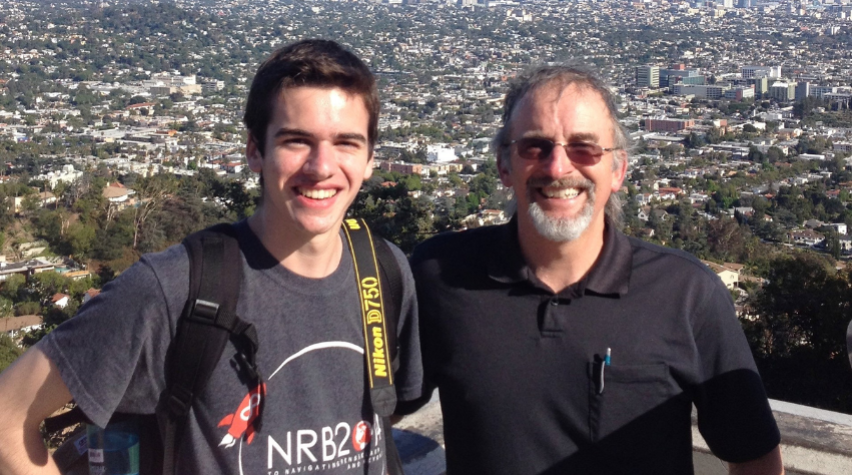
Wayne Bequette (Right) and Brendan Fahy Bequette (Left), at the Griffith Observatory in 2016 during a trip to LA to visit several movie studios
The 5th Cell Therapies and Immunotherapy Conference, organized by AIChE’s Society for Biological Engineering (SBE), will be held October 28–30, 2024 at the Manchester Grand Hyatt San Diego in San Diego, CA. Renowned experts and thought leaders from clinical, industrial, and academic settings, will discuss the latest developments in these fields, and address challenges and discoveries in the cell therapy and immunotherapy arenas.
We spoke with B. Wayne Bequette, Professor at the Rensselaer Polytechnic Institute in the Department of Chemical and Biological Engineering, and Technology Manager at the CESMII Northern Regional Manufacturing Center, to discuss what he’ll be sharing at the conference, trends in the field of cell therapies, and how new cell therapies and immunotherapy technologies can solve some of the challenges facing engineering and society today.
What inspired you to do research in the field of cell therapies?
I am in this field because of my son, Brendan Fahy Bequette, who was a filmmaker in New York City. He was diagnosed with a rare mediastinal germ cell tumor in 2020 at age 24, and went through many lines of chemo and immunotherapy. His last hope was a clinical trial for a novel CAR-T treatment for solid tumors. Unfortunately, the trial was delayed by over six months while the sponsor automated the process, and Brendan died during this period. Thus, I was motivated to enter the cell and gene manufacturing field to reduce the number of people that die while awaiting treatment. I should note that my prior efforts in the development of an automated insulin delivery system were motivated by my sister, who was diagnosed with type 1 diabetes in 1977. She was an eyewitness to the tremendous diabetes technology changes over the past five decades and has been on a closed-loop device for over six years.
How do you envision your field of research solving some of the challenges in society?
Smart manufacturing principles have enabled manufacturers to move from independent data silos to integrated systems for improved decision-making throughout the enterprise. Similarly, my goals for biomedicine are to better integrate data, modeling and decision-making from therapeutic discovery, development, and clinical trials, to treatment and long-term patient monitoring. As a specific example, shouldn’t an oncologist understand current supply-chain limitations to help choose one cancer therapeutic over another for a particular patient? This is important for autologous CAR-T therapies where “vein-to-vein” time can vary from 21 to 45 days or more. While my focus is on cancer, these basic ideas can also be applied to auto-immune and other diseases.
Are there any new developments, technologies, or applications of technologies in cell therapies and immunotherapy that you are particularly excited about?
All FDA-approved CAR-T therapies are autologous, primarily because of concerns about graft vs. host disease, and the clinical trial and real-world results are consistent. Recent phase 1 results for an allogeneic CAR-T trial for multiple myeloma are promising. Since allogeneic manufacturing is more scalable than autologous manufacturing, treatment could be provided “on demand,” resulting in a tremendous impact on the number of patients that can be treated with little time on a waitlist. Also, 20–50% of CAR-T treatments do not result in long-term remission, so there are critical studies involving combination therapies, such as CAR-T with anti-body treatments, to improve outcome success.
What are you hoping the audience takes away from this conference and your presentation?
Graduate students are often, understandably, focused on very specific topics to be able to publish a dissertation. I encourage them to appreciate every aspect of the “human element” — from interactions with students in their research group and department, to collaborators at other institutions on large-scale projects, to the potential final user(s) of the technology — and to see the “big picture.” Smart manufacturing techniques can assist with improved decision-making at all levels/scales of the treatment process. Long-term, it would be great if an oncologist, based on information when a patient is first diagnosed, realized that standard treatments are unlikely to be successful and thus skip directly to more advanced therapies, such as cell and gene therapy. We are far from convincing insurance companies to make a $500,000 treatment without first going through the standard lines of treatment, however!
Learn more about the 5th Cell Therapies and Immunotherapy Conference.
Group Registration Discount: A discount of 15% is available for groups of five or more regular participants of the same affiliation (e.g., universities, research institutes, or companies); it does not apply to students. Email aibhl@aiche.org for promo code.
Conference Grants Available: Funding is available to help sponsor some registrations and travel costs for the Cell Therapies 2024 conference. Students, post-docs, and early-career professionals are encouraged to apply. Apply today.
About SBE
Established in 2004, the Society for Biological Engineering is a technological community for engineers and applied scientists integrating biology with engineering. Members of SBE come from a broad spectrum of industries and disciplines and share in SBE’s mission of realizing the benefits of bioprocessing, biomedical, and biomolecular applications. Learn more about SBE.

